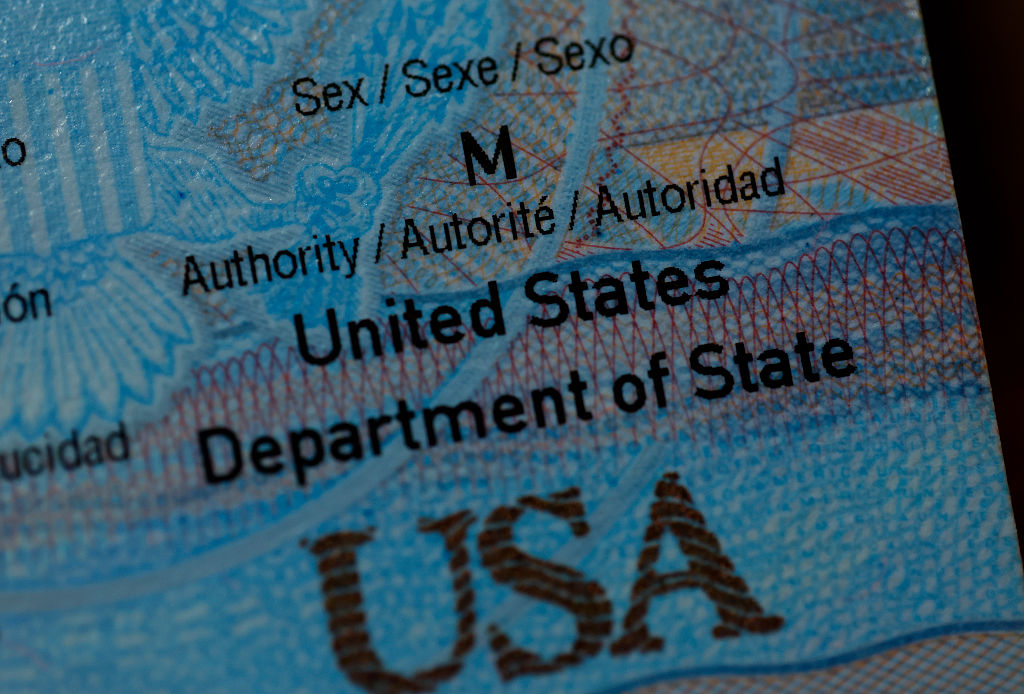The Supreme Court on Thursday allowed the Trump Administration to enforce a policy that would require all passports to reflect the holder’s assigned sex at birth, blocking people from choosing a marker that may better align with their gender identity.
[time-brightcove not-tgx=”true”]
It’s another victory for President Donald Trump, who has cracked down on the rights of transgender, nonbinary, and intersex Americans. In an unsigned decision, the conservative-majority court granted the Administration’s emergency request to stay a district judge’s June injunction on the passport sex marker policy while litigation on the policy continues in lower courts.
The injunction required the State Department to allow passport applicants to continue to be able to self-select the sex marker on their passports—either “M” for male or “F” for female or even “X” for neither. The Administration submitted an emergency filing to the Supreme Court after an appeals court declined to block the injunction.
The Supreme Court’s decision—which doesn’t indicate how each justice voted but does note that the three liberal justices Ketanji Brown Jackson, Elena Kagan, and Sonia Sotomayor dissented—asserts: “Displaying passport holders’ sex at birth no more offends equal protection principles than displaying their country of birth—in both cases, the Government is merely attesting to a historical fact without subjecting anyone to differential treatment.”
Jackson, who penned the dissent, claimed that the Court’s decision to stay the injunction pending appeal “misunderstands the assignment” and “paved the way for the immediate infliction of injury without adequate (or, really, any) justification.”
Jackson wrote: “The Government seeks to enforce a questionably legal new policy immediately, but it offers no evidence that it will suffer any harm if it is temporarily enjoined from doing so, while the plaintiffs will be subject to imminent, concrete injury if the policy goes into effect.”
The American Civil Liberties Union, which challenged the Administration’s policy through a class action suit filed in February, described the Supreme Court’s decision Thursday as “a heartbreaking setback for the freedom of all people to be themselves, and fuel on the fire the Trump administration is stoking against transgender people and their constitutional rights.” Jon Davidson, senior counsel for the ACLU’s LGBTQ & HIV Project, added, “Forcing transgender people to carry passports that out them against their will increases the risk that they will face harassment and violence and adds to the considerable barriers they already face in securing freedom, safety, and acceptance.”
Attorney General Pam Bondi, meanwhile, celebrated the decision and reiterated the Administration’s resolve to push back against freedoms of gender identity and expression. “Today’s stay allows the government to require citizens to list their biological sex on their passport,” Bondi posted on X. “In other words: there are two sexes, and our attorneys will continue fighting for that simple truth.”
A dramatic reversal of practice
Trump issued the Executive Order in question on his first day back in office earlier this year, declaring that the U.S. will only recognize two sexes—male and female. Under that order, he directed agencies to require that government-issued identification documents, including passports, “accurately reflect the holder’s sex.”
The Administration’s policy on passport sex markers reverses decades of practice at the State Department. Sex markers have appeared in passports since the 1970s. But since 1992, passport applicants could choose different sex markers from what they were assigned at birth, provided they have supporting medical documents. In 2021, the State Department, under President Joe Biden, removed the documentary requirements and added the third option “X” for nonbinary, intersex, and gender non-conforming applicants.
According to estimates from the Williams Institute at UCLA, the U.S. has about 1.6 million transgender people aged 13 and older and 1.2 million nonbinary adults. The Department of Health and Human Services estimates the number of intersex individuals in the U.S. at over 5 million.
The ACLU said that soon after Trump’s Executive Order, the State Department began refusing to release new, renewed, or changed passports with a sex marker other than what the department believed to be the applicant’s assigned sex at birth.
Transgender individuals challenged the policy, arguing that it violates their Fifth Amendment rights as well as the Administrative Procedure Act. Ashton Orr, the named plaintiff in the case, is a transgender man from West Virginia who, according to court documents, had been accused by transportation officials of presenting fake identity documents.
Federal judge Julia Kobick in Massachusetts issued a preliminary injunction stopping the Administration from enforcing the policy against Orr and six other individual plaintiffs in April. And in June, Kobick expanded the injunction’s coverage to cover all transgender, nonbinary, and intersex applicants. The U.S. Court of Appeals in the First Circuit in Boston denied the government’s appeal against Kobick’s injunction in September.
While the passport markers case remains pending even as the Supreme Court has allowed it to be enforced in the meantime, it’s just one of several ways the second-term Trump Administration has curtailed LGBT rights, particularly transgender rights.
In January, Trump signed an order banning gender-affirming care for those under 19. He also signed an order banning transgender women from competing in women’s sports. And in May, the Supreme Court allowed the Administration to enforce a ban on transgender people from serving in the military.
But the effects of Trump’s efforts may go beyond the transgender community, Chase Strangio, the ACLU’s co-director for the LGBTQ & HIV Rights Project told PBS in February. “What these Executive Orders do, what these laws do is open the door to sex-based policing,” Strangio said, “that cannot be enforced without subjecting everyone to some sort of scrutiny, to some sort of invasive process that will harm us all.”

